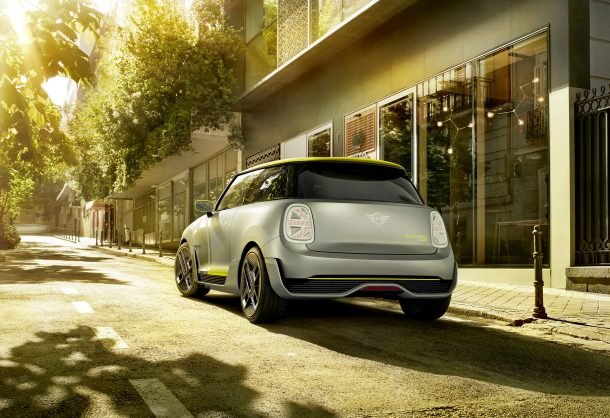Mini Survey Showcases Mixed Opinions on EVs

With governments strongly encouraging the growth of electric vehicles and automakers repositioning various brands to align with that goal, it’s worth a manufacturer’s time to examine the market. Mini, which BMW Group intends to evolve into an EV-focused nameplate, plans to release its first battery powered vehicle in 2020. However, before that occurs, the brand decided to commission Engine International for a little market research.
The firm conducted a general population survey of 1,004 presumably average Americans — all above the age of 18 and split equally by gender. Unfortunately for BMW, the results were less than promising. Most people still don’t seem to have a handle on what EVs offer or how they function. However, that might not necessarily be because they are clueless morons. Apathy undoubtedly plays a role here, especially as EV ownership remains relatively rare.
“It is important for us as a brand to understand how consumers want to use their electric vehicles, and what they know and don’t know about them as we move closer to the launch of the MINI Cooper S E electric vehicle in the U.S.,” said Andrew Cutler, head of Mini’s corporate communications in the U.S. “The more intelligence we gather, the more we can educate consumers about the many benefits of electric mobility and what MINI has to offer in the new MINI Cooper S E electric vehicle coming in early 2020.”
With 74 percent of respondents claiming they had no clue where the nearest EV charging station is located in relation to their home and 66 percent claiming to believe that electric cars were primarily for early adopters, Mini said the survey underscored a need to “raise mainstream awareness around EV technology.”
That’s no doubt true, especially if the brand hopes to thrive after shifting away from internal combustion engines. We’re more inclined to believe that mainstream tastes simply haven’t caught up to electric cars. They’re still relatively novel contraptions associated with a mobility culture that makes some people a little uneasy.
Other less encouraging aspects of the survey included feedback on charging times and what EVs were good for. Most individuals claimed they were primarily for commuting and urban driving. It’s an assumption many automakers are trying to change, but you one could still make a strong case for. While charging stations are cropping up all over North America, the network isn’t quite robust enough to ensure headache-free EV ownership across the board. Relatively wide gaps in some rural areas remain.
When consumers were asked to choose an acceptable amount of time it should take to charge an EV, the most popular answer (at 28 percent) was “I don’t know,” followed by “30 minutes” (at 25 percent). As charging/battery technology continues to advance, times vary wildly between vehicles and stations. At-home charging frequently requires tucking the car in for the night while some newer e-vehicles, utilizing high-capacity stations, can get a majority charge within 30 minutes. However, a complete charge usually takes substantially more time — if you have a smartphone, you’ve seen this phenomenon in action. That last 20 percent always seems to take forever.
There was some good news for Mini within the survey, though. The company said that many who responded to the poll indicated the federal tax credit would not be a significant part of their decision making process if they decided to purchase an electric car — perhaps because they were unaware that it equates to free money from the government. We don’t care what you’re buying — a $7,500 tax credit is absolutely going to influence your decision.
The automaker also claimed that 73 percent of the consumers surveyed said that a battery range of up to 75 miles was sufficient for their daily use. That’s something carmakers can deliver now, suggesting that range anxiety might not be a problem for Mini or BMW Group as the shift toward electrification continues. But we still think a cautious approach is the correct one. Build those EVs and improve the charging network; just don’t presume your customer base is universally ready — even with the proper education from automakers.
[Images: BMW Group]

A staunch consumer advocate tracking industry trends and regulation. Before joining TTAC, Matt spent a decade working for marketing and research firms based in NYC. Clients included several of the world’s largest automakers, global tire brands, and aftermarket part suppliers. Dissatisfied with the corporate world and resentful of having to wear suits everyday, he pivoted to writing about cars. Since then, that man has become an ardent supporter of the right-to-repair movement, been interviewed on the auto industry by national radio broadcasts, driven more rental cars than anyone ever should, participated in amateur rallying events, and received the requisite minimum training as sanctioned by the SCCA. Handy with a wrench, Matt grew up surrounded by Detroit auto workers and managed to get a pizza delivery job before he was legally eligible. He later found himself driving box trucks through Manhattan, guaranteeing future sympathy for actual truckers. He continues to conduct research pertaining to the automotive sector as an independent contractor and has since moved back to his native Michigan, closer to where the cars are born. A contrarian, Matt claims to prefer understeer — stating that front and all-wheel drive vehicles cater best to his driving style.
More by Matt Posky
Latest Car Reviews
Read moreLatest Product Reviews
Read moreRecent Comments
- W Conrad I'm not afraid of them, but they aren't needed for everyone or everywhere. Long haul and highway driving sure, but in the city, nope.
- Jalop1991 In a manner similar to PHEV being the correct answer, I declare RPVs to be the correct answer here.We're doing it with certain aircraft; why not with cars on the ground, using hardware and tools like Telsa's "FSD" or GM's "SuperCruise" as the base?Take the local Uber driver out of the car, and put him in a professional centralized environment from where he drives me around. The system and the individual car can have awareness as well as gates, but he's responsible for the driving.Put the tech into my car, and let me buy it as needed. I need someone else to drive me home; hit the button and voila, I've hired a driver for the moment. I don't want to drive 11 hours to my vacation spot; hire the remote pilot for that. When I get there, I have my car and he's still at his normal location, piloting cars for other people.The system would allow for driver rest period, like what's required for truckers, so I might end up with multiple people driving me to the coast. I don't care. And they don't have to be physically with me, therefore they can be way cheaper.Charge taxi-type per-mile rates. For long drives, offer per-trip rates. Offer subscriptions, including miles/hours. Whatever.(And for grins, dress the remote pilots all as Johnnie.)Start this out with big rigs. Take the trucker away from the long haul driving, and let him be there for emergencies and the short haul parts of the trip.And in a manner similar to PHEVs being discredited, I fully expect to be razzed for this brilliant idea (not unlike how Alan Kay wasn't recognized until many many years later for his Dynabook vision).
- B-BodyBuick84 Not afraid of AV's as I highly doubt they will ever be %100 viable for our roads. Stop-and-go downtown city or rush hour highway traffic? I can see that, but otherwise there's simply too many variables. Bad weather conditions, faded road lines or markings, reflective surfaces with glare, etc. There's also the issue of cultural norms. About a decade ago there was actually an online test called 'The Morality Machine' one could do online where you were in control of an AV and choose what action to take when a crash was inevitable. I think something like 2.5 million people across the world participated? For example, do you hit and most likely kill the elderly couple strolling across the crosswalk or crash the vehicle into a cement barrier and almost certainly cause the death of the vehicle occupants? What if it's a parent and child? In N. America 98% of people choose to hit the elderly couple and save themselves while in Asia, the exact opposite happened where 98% choose to hit the parent and child. Why? Cultural differences. Asia puts a lot of emphasis on respecting their elderly while N. America has a culture of 'save/ protect the children'. Are these AV's going to respect that culture? Is a VW Jetta or Buick Envision AV going to have different programming depending on whether it's sold in Canada or Taiwan? how's that going to effect legislation and legal battles when a crash inevitibly does happen? These are the true barriers to mass AV adoption, and in the 10 years since that test came out, there has been zero answers or progress on this matter. So no, I'm not afraid of AV's simply because with the exception of a few specific situations, most avenues are going to prove to be a dead-end for automakers.
- Mike Bradley Autonomous cars were developed in Silicon Valley. For new products there, the standard business plan is to put a barely-functioning product on the market right away and wait for the early-adopter customers to find the flaws. That's exactly what's happened. Detroit's plan is pretty much the opposite, but Detroit isn't developing this product. That's why dealers, for instance, haven't been trained in the cars.
- Dartman https://apnews.com/article/artificial-intelligence-fighter-jets-air-force-6a1100c96a73ca9b7f41cbd6a2753fdaAutonomous/Ai is here now. The question is implementation and acceptance.



































Comments
Join the conversation
People claim to only need 75 miles of range, but people don't buy "need", they buy "want". If we only bought need, virtually no one would be buying SUVs because virtually no one needs to go off road. Virtually no one would be buying an engine or suspension upgrade because the base 2.5 liter 150 hp with skinny all-season radials is more than enough to break every speed law in the USA. Nobody also needs sunroofs, ventilated seats, 900 speaker stereos, or a 21 foot long pickups with 10,000+ lbs of towing capacity, but they buy them because they "want" them. 75 miles would be more than enough for most people's commuter needs, but people "want" to be able to drive across the country at a moments notice, or off-road far away from power outlets, or to get in and out of a car without having to constantly remember to plug-in or unplug the damn battery with some bulky cable.
"Most people still don’t seem to have a handle on what EVs offer or how they function." So? If you need to educate your customers on features/benefits, that's part of the sales process. Maybe the problem is that BMW/MINI relies on its badge and its salescritters don't know how to educate people. Just spitballing the obvious....